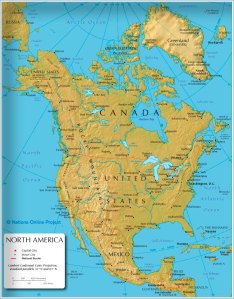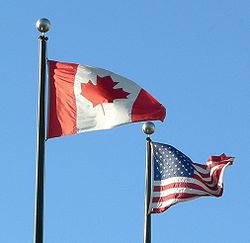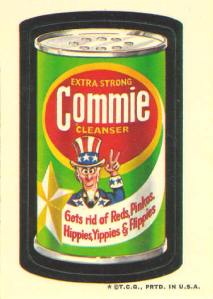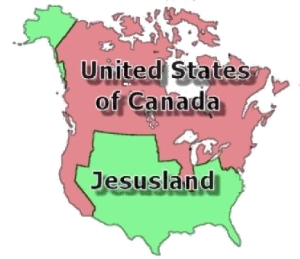DISCLAIMERS:
- This is a long posting, so settle in or read it in chunks.
- This one could get me a lot of comments, particularly from Americans. I know how it will come across to some and I understand defensiveness, but please try to read with an open mind.
- The opinions herein are opinions, but they are informed by research. They are generalizations only. No one statement refers to all people. Never would I use the word “all” and in fact I seldom use the word “most.” What I’m talking about here is big-picture perceptions of Canada and the U.S. I know that some Canadians are awesome and some Canadians suck. I know that some Americans are awesome and some Americans suck. Canada and the United States are both great countries, relative to many of the other countries in the world. I like the U.S., and I appreciate your contributions to the world in science, art, humanitarianism, and your good people.
 Many people see North America as one homogenized socio-political glob. Or, more aptly, they see North America as the U.S., and Canada as barely distinct from America, as inconsequential, as America’s “little sister.” (I like to joke that this is true in that Canada is Lisa Simpson and America is Bart.)
Many people see North America as one homogenized socio-political glob. Or, more aptly, they see North America as the U.S., and Canada as barely distinct from America, as inconsequential, as America’s “little sister.” (I like to joke that this is true in that Canada is Lisa Simpson and America is Bart.)
Americans don’t really care much about Canada (except those who wanted to immigrate here during the reign of Bush Jr.), and they don’t really care if they are lumped in with Canada politically, socially, or culturally (although they are always quick to point out that Celine Dion belongs to us!). On the other hand, many Canadians don’t like being lumped in with Americans, especially in the past eight years. (You read about Americans travelling overseas having to pretend that they’re Canadian, even going so far as to wear Canadian flags and get fake Canadian passport covers. Now imagine being an actual Canadian mistaken for an American during this time!)
Yesterday U.S. President Barack Obama visited Ottawa and Canadians were practically peeing their pants with excitement over it. It got me thinking about why we’re so excited about this president, and about the historical differences between Canada and America.
Sure, we share the same chunk of land and ingest the same food, art, and pop culture, but from equal marriage (in 2005 Canada became the third or fourth country, depending on the source, to legalize same-sex marriage), to legalized pot (Canada has decriminalized small amounts of marijuana), to the separation of church and state (Canada keeps religion where it belongs—out of politics), the two nations are almost diametric. Why?
I first started thinking about this many months ago when a friend of mine told me about an article he read. It was something about  how the births of Canada and the United States as nations reveal a lot about what kind of countries they are today. Wouldn’t it be nice if I had the link here? Sadly I don’t even know the name of the publication or what exactly the article said. But what follows is what I think the gist of it was.
how the births of Canada and the United States as nations reveal a lot about what kind of countries they are today. Wouldn’t it be nice if I had the link here? Sadly I don’t even know the name of the publication or what exactly the article said. But what follows is what I think the gist of it was.
Here is Canada’s birth in a nutshell. Both the English and the French came to Canada in the late 1550s/early 1600s and established settlements and colonies. Of course there were wars between the two and a bunch of other stuff happened: the original 13 colonies of the United States were handed over to America by the British, “New France” grew and shrank, Canada was divided into Upper (French) and Lower (English) Canada, there was the War of 1812 between the U.S. and Britain, blah, blah, blah.
Although Canada came close to having a massive rebellion and maybe even a civil war, we did not. Instead, Canadians were hungry for unity and responsible government, so French and English Canadians united under the Act of Union. In 1840 “The Canadas” became “The United Province of Canada” and by 1849 parliamentary democracy was established for all of the provinces. Confederation occurred in 1867 with The Constitution Act, and “The United Province of Canada” became “Canada.”
Canada gained independence slowly throughout the years via the Constitution Act, participation in World War I, and joining the League of Nations independently from Britain in 1919, among other things. In 1931 Britain affirmed Canada’s independence with The Statute of Westminster, deeming Canada and the other former dominions (including Australia, New Zealand, Ireland, and South Africa) “autonomous communities.”
Throughout the years, Canada adopted official bilingualism, official multiculturalism, social programs such as universal health care, and the Charter of Rights and Freedoms. All was looking just dandy. But Quebec’s “Quiet Revolution” sparked a nationalist movement seeking secession from the rest of Canada. In 1980, Canada held a referendum, in which we rejected secession (sovereignty). In 1995 we held a second referendum, in which we also rejected sovereignty (but just barely). In 1997, the Supreme Court of Canada ruled secession unconstitutional.
Okay, now on to the U.S. The United States was colonized by a lot of European countries from the late 1400s until the 1700s, but mainly Britain, which established the aforementioned 13 colonies (“The Thirteen Colonies”). In 1775 The Thirteen Colonies declared their independence from Britain and attempted to gain said independence via armed conflict. This was the American Revolutionary War and, with the help of France and Spain, the Americans were successful. But it was a bloody and brutal war.
For about 50 or 60 years following, America expanded westward. But in the 1850s and 1860s, conflict between northern and southern Americans escalated. Essentially they disagreed on just about everything, especially the issues of slavery and how the government should be run. In 1861, after Abraham Lincoln was elected, most of the southern states seceded from the union and established The Confederate States of America (P.S. see the movie by the same title!), which sparked the Civil War. And we all know how bloody and brutal that was—the U.S. lost 8% to 10% of its entire male population.
The point of this quickie history lesson is that Canada did not have a bloody revolution. Rather, it quietly gained its independence from Britain. Nor did Canada have a bloody civil war. Rather, it democratically held referendums on the issue of separatism. The United States had both a bloody revolutionary war to gain its independence from Britain and a bloody civil war to deal with the issue of separatism.
This, I think, was the thesis of the article my friend told me about: The independence and unity of Canada was achieved politely, quietly, and democratically, whereas the independence and unity of the U.S. was achieved through violent wars. This illustrates the divergent…aesthetic? ethic? ideology? sensibility?…of these countries today.
While Canada and the U.S. share the famed “longest undefended border in the world” and are each other’s best ally and largest trading partner, we couldn’t be more different in what makes us us.
A little-known fact is that when World War II ended, Canada had one of the largest armed forces in the world. Who would have thought that?! But Canada didn’t go all imperialist and superpower-y. Instead we were one of the founding members of the United Nations and are known the world over as a peace-keeping nation.
During the last U.S. election, it was funny to the outside world, especially Western countries like Canada, to see some Americans demonize any candidate favouring peace over war, taking care of the less fortunate over “every man for himself,” or seeking unity over individualism.
I’m sure you remember it. Argh, I hate to even bring up this guy’s name because I am so sick of him, but…Samuel Wurzelbacher. You know, the guys who’s name isn’t Joe and who wasn’t a licensed plumber? Yeah, that guy. In his exchange with Barack Obama over Obama’s plan to raise taxes by 3% for people making over $250,000 a year and lower them for the rest, Obama said this:
“I’m gonna cut taxes a little bit more for the folks who are most in need and for the 5% of the folks who are doing very well—even though they’ve been working hard and I appreciate that—I just want to make sure they’re paying a little bit more in order to pay for those other tax cuts. And I do believe for folks like me who have worked hard, but frankly also been lucky, I don’t mind paying just a little bit more than the waitress that I just met over there…[who] can barely make the rent. My attitude is that if the economy’s good for folks from the bottom up, it’s gonna be good for everybody. I think when you spread the wealth around, it’s good for everybody.”
And you remember what happened next. Republicans took “spread the wealth” in a death grip and would not let go.
 Communist! Socialist! Commie! Red! Terrorist!
Communist! Socialist! Commie! Red! Terrorist!
Suddenly the party line on the right seemed to be that if you are in favour of balancing out the classist economic structure by making the stinking rich a little less stinking and the poor a little less poor, then you’re a communist/socialist. If you’re in favour of pulling troops out of Iraq, you’re a communist/socialist. If you’re in favour of universal health care, you’re a communist/socialist. If you’re in favour of welfare reform, you are a communist/ socialist.
So many things about this are funny. First of all, that these Americans used “communist” and “socialist” interchangeably (not to mention “liberal” and “terrorist”). They are not synonyms. Communism is a system whereby the government controls the means of production—there is a very rich upper class, but everyone else makes the same amount of money. (So if anything, Obama’s plan is anti-communist.) Socialism is a system that allows private enterprise and personal success, but the government provides necessities such as hospitals and schools, plus welfare for those who can’t work to afford food and shelter.
America is not yet socialist, but the funniest part about this to me is that many Americans believe this would be evil!
Some people are anti-science, until they need that new cancer treatment to save their life. Some people are anti-socialism, until they lose your job and can’t get another one. Some people are anti-government, until the market needs a bailout.
I would say Canada is a socially democratic country. We have universal health care. I don’t have medical benefits through my job, so if I fall down and crack my head open I can go to any hospital, get treated, and go home, and I will not receive a bill. I will not have to go on social assistance, sell drugs, rob a house, sell my stuff, or be rendered homeless because I cannot pay my medical bills. If I get sick or injured and can’t work, or if I lose my job and can’t find a new one right away, the government will help me afford food and shelter while I’m not working, but I can’t just sit around on my ass in the meantime.
These aren’t handouts. We all pay taxes. We pay taxes to keep our roads paved and cleared of snow, and our street lights working. And we pay taxes so that every single person, regardless of how much money they make, can get healthy if they are sick, fixed if they are broken.
But for some astronomically unbelievable reason, many Americans (let’s face it—it’s mostly Republicans) think this is a bad thing.
I think that Canada’s “nationalism,” our sense of what makes Canada Canada, comes from its people preferring a system of justice, fairness, equality, and democracy for all.
America’s nationalism seems to come from its pursuit of “the American dream,” which originally meant to amass material wealth. It has morphed through the years, piquing in the 1950s and 1960s I think, into getting married, owning a house (or two) and a couple of cars, having a couple of kids and a dog, and making lots of money so they can buy boats and go on vacations and retire wealthy. But do not ask me to sacrifice for anyone but me because I’m pursuing the American dream! This propagates a system of justice, fairness, equality, and democracy for some—mainly those who can afford it.
Canada recognizes and values the role of government in society to keep order and peace, and to make sure money is collected from individuals to better society as a whole. From what I can tell, the U.S. values a limited government to do the bare-bones stuff, and leaves everything else in the hands of the marketplace. That good ole free market that was left to run rampant so that citizens would never be curtailed in their pursuit of happiness (i.e., accruing the most money and stuff).
Canada has a collectivist nature. The United States is based on individualism.
That being said, while Americans claim individuality and are in fact individualistic in their system, they are politically conformist. Most Americans are “registered” as an adherent to either the Democratic or Republican party (some are Independent). The two-party system ensures that most Americans pledge blind allegiance to their party, regardless of its actions or stances.
Blind allegiance is a dangerous thing. All it takes is a rally, speech, commercial, or talk-show appearance to make people start chanting “drill baby drill” or “Iraq has WMD” or “Obama is a terrorist” like mindless automatons.
While Canadians generally respect their government’s authority, we are not blindly obedient to it. We tend think critically, analyze evidence, and question authority.
We have a multi-party system and we do not “register” as a party member. Our political system is much more nuanced, much more of a spectrum. It is not black and white.
The American point of view seems to be that Canada is boring and inconsequential. They think our lack of drama or militaristic history deprives us of an identity or “destiny.” I guess it depends on what your priorities are. I am proud of our lack of drama and militaristic history. During Vietnam (and the Iraq “war”), Canada opened its doors to American draft dodgers and war resistors. We firmly said “NO” to George W. Bush’s invitation to join America in its invasion of Iraq (for some Canadians, one of our proudest moments).
I’m glad my country is not a superpower because history has shown us what being a superpower leads to. Was it Ghandi who said “absolute power corrupts absolutely”? If history has taught us anything, it is that the rise of an imperialist power always leads to the fall of an imperialist power. And sadly, they take down a lot of others in their wakes.
Canada would rather fight for the progress of social justice than fight for world power.
But America seems to have a messianic sense of its destiny as a world power, a democratizer (new word for conqueror?). Political speeches and interviews are littered with language to this effect. There is an action movie-like, self-inflated, overly confident, exuberant sense of a mission to “save the world!” But often they jump in over their heads (Iraq anyone?) and then are too proud to admit mistakes and cut their losses (Vietnam, Iraq).
I understand this from a moralistic viewpoint. Clearly those of us living in democratic countries believe it’s a better system than, say, communism or fascism! But the U.S. seems to view its own politics and international politics through a moralistic, ideological lens only.
It’s hard to peer through an ideological lens with a critical eye.
And most of the world does not view America as the moral beacon they seem to think they are.
The United States is the most religious country in the western world. Not only does it use religion to dictate morality (not realizing that morality predates religion), but it politicizes religion. “Separation of church and state” is a quaint ideal, but anyone who pays attention to U.S. politics knows that it’s not the reality. The ironic thing is that the U.S. shares much in common with regimes they purport to despise. Having religion dictate politics and law is more akin to the Muslim world.
If I were to describe a world leader who had weapons of mass destruction, was fundamentally religious, and believed that his god spoke to him and told him what to do, you’d be scared. Your mind’s eye would probably look towards the Middle East. But that leader was George W. Bush.
Canada is a more “typically” Western society; it is more European than American in its sensibilities. It is politically secular, hierarchical, law-abiding, and respects authority when it is right and questions it when it is wrong. We have the aforementioned multi-party system of government. I do not know what my Prime Minister’s religion is, and I don’t care! Most Canadians don’t.
That’s not to say that there aren’t religious people in our nation—there are, but they know that religion should play no role in politics. Our Prime Minister would never end a speech or press conference asking any god to bless our country, [I stand corrected: I have been informed that Prime Minister Stephen Harper has begun a greatly controversial habit of saying “God bless Canada” after speeches. Many people consider this “un-Canadian” and another way in which Harper was too close to George W. Bush for our liking. For an article on this topic, read this; it’s pretty frightening.] …nor invoke the power of any deity to help him do his job. But the presidents of the United States always do. In a Canadian candidates’ debate, no one would ask any

This joke overtook the web and inundated inboxes after the election of George W. Bush.
question having to do with the candidates’ religion or religious ideals. In America, they had an entire debate dedicated solely to religion!
Michael Adams is an author and pollster at Environics who has polled Canadians and Americans and reports on the differences between our values. He claims that there is a lot that makes Canada distinct from America, and that the distinctiveness is growing. Adams says that religion means different things to Canadians and Americans. Canadians view religion as “a means of confronting the mysterious aspects of our lives.” For Americans, it’s “a way of eliminating rather than exploring mystery…, one big answer rather than a collection of venerable questions…the end of dialogue, not its beginning.”
Adams confirms my earlier conjecture that Americans tend towards political conformity, and also reports that they express themselves violently and are more apt to accept violence than Canadians, who can have disagreements without violence. Adams states that Canadians accept cultural and ideological diversity much more so than Americans.
(Adams’s findings are very interesting and I encourage you to read them. For example, the differences between Canada and the U.S. in their views of patriarchy raised my eyebrows. Check out the link above and read his book Fire and Ice: The United States, Canada and the Myth of Converging Values.)
So while Canada may be akin to the United States in many ways, it is different in more important ways. We fight for our own cultural identity with laws protecting Canadian art and commerce, for example, because we know that what makes Canada fundamentally Canada is too important to be lost.
And with their landslide election of a president whose socialist and diplomatic ideals are much more closely aligned to those of Canada than to those of the America of the past (excepting his religiosity and anti-equal marriage views), maybe Americans are realizing they could use a dose of “Canada-ness” in their country.
 Many people see North America as one homogenized socio-political glob. Or, more aptly, they see North America as the U.S., and Canada as barely distinct from America, as inconsequential, as America’s “little sister.” (I like to joke that this is true in that Canada is Lisa Simpson and America is Bart.)
Many people see North America as one homogenized socio-political glob. Or, more aptly, they see North America as the U.S., and Canada as barely distinct from America, as inconsequential, as America’s “little sister.” (I like to joke that this is true in that Canada is Lisa Simpson and America is Bart.) how the births of Canada and the United States as nations reveal a lot about what kind of countries they are today. Wouldn’t it be nice if I had the link here? Sadly I don’t even know the name of the publication or what exactly the article said. But what follows is what I think the gist of it was.
how the births of Canada and the United States as nations reveal a lot about what kind of countries they are today. Wouldn’t it be nice if I had the link here? Sadly I don’t even know the name of the publication or what exactly the article said. But what follows is what I think the gist of it was. Communist! Socialist! Commie! Red! Terrorist!
Communist! Socialist! Commie! Red! Terrorist!